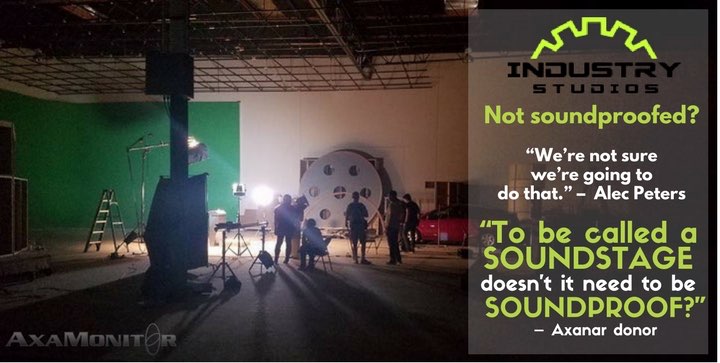
‘SOUND’ FOOTING? Despite spending hundreds of thousands of donors’ dollars building his Industry Studios business, Axanar producer Alec Peters revealed his soundstage isn’t soundproofed, and may never be because of cost. Photo/Industry Studios
Thin Financial Report and a New Crowdfund Campaign
Ten Months Later, So-Called Independent Report Mysteriously Disappears From Axanar Website
Table of Contents
UPDATE On January 24, 2018, Axanar’s Donor Memo and Financial Report was discovered to have been removed from the Axanar website. Fortunately, the document is archived elsewhere. Read here »
Axanar has released its long-promised financial review, part of a package of news for its donors, including some of its future plans post-lawsuit and a new crowdfunding campaign to pay for the rent of the studio it built with donations meant to produce a film.
 COMIC BOOK AxaMonitor has published a digital comic book, “Think of the Children,” that offers a lighthearted, easy-to-understand explanation of Axanar’s finances.
COMIC BOOK AxaMonitor has published a digital comic book, “Think of the Children,” that offers a lighthearted, easy-to-understand explanation of Axanar’s finances.
In a seven-page memorandum emailed to his donors on March 8, 2017, Axanar producer Alec Peters laid out his plans for:
- Future fan films to be made by Axanar Productions.
- Establishing what he called “the first fan-funded movie studio.”
- Propping up his beleaguered Industry Studios, built with money raised to make a never-produced feature film, and hemorrhaging $15,000 a month in rent and utilities. Also came the revelation his soundstage isn’t even soundproofed.
Financial Report
The memo also included a 1½-page introduction by Peters to Axanar’s “independent” financial review, followed by a one-page report and a one-page summary of Axanar’s income and expenses for three years.
THE NEW ‘AXANAR’ The March 8, 2017, donor update revealed what form Axanar will take, reduced by the lawsuit settlement from feature length to two 15-minute segments: “These will be presented as Episodes Four and Five of The Four Years War Documentary, picking up where Episode Three, Prelude to Axanar, left off and tell the story of the Battle of Axanar and the peace that followed.”
TRANSMEDIA PRODUCTION Producer Alec Peters also promised donors an Axanar “trans-media production,” including “an audio drama of the full script, a complete illustrated script with production art, story boards and graphics and written fiction to fill in the gaps in this amazing story.”1)
Peters announced the review in November 2016 following a court filing by the plaintiffs, CBS and Paramount Pictures, in their year-long copyright infringement lawsuit against Peters and Axanar that eventually settled out of court in January 2017.
Personal Spending
See also: Peters' Personal Spending Spurs Axanar Accounting
The filing documented, based on records produced by Peters in the first of two depositions, thousands of dollars in what appeared to be lavish personal spending of donor money by Peters, including such expenses as health insurance, mobile phone bills, restaurant bills, car maintenance, tires.
Peters had long claimed he had put in $150,000 of his own money to keep Axanar afloat after donor money ran out in 2016, essentially paying back the questioned expenses and the salary he had claimed in 2015. The plaintiffs denounced that as an “after the fact” transaction intended to obfuscate how he had actually spent the money in real time.
‘What the report lacked was any documentation whatsoever — for expenses or income — especially the personal cash infusion Peters claimed he and others put into the corporation.’ — ‘No Documentation’
In his introductory letter, Peters explained:
It should be noted that no donor money went to myself in either salary or expense reimbursement. Legitimate business expenses like insurance, meals, travel, auto reimbursement and salary, were all paid for by myself and the others who donated their support and made up the almost $300,000 in additional expenses covered beyond what donors paid for.
Axanar’s 2015 annual report reported a $38,167 salary for Peters, as well as another $3,099 for his actors’ union dues. For most of 2016 he staunchly defended having taken a salary, stating in one instance:
I paid back 100% of that salary and have put almost $150,000 of my own money in this project. What else you got? And besides … I have worked full time on this production for 2½ years. I love that in your world people miraculously donate all their time for no pay working full time.2)
Salary/No Salary?
Peters justified paying himself because he worked full time on his project. “Charities,” he wrote, “pay salaries to their full-time employees.“3)
Peters failed to note that Axanar Productions is not a charity, even though it has often portrayed itself as a nonprofit organization; it was instead registered at the time as a for-profit corporation in California. And why justify paying a salary he now claims he didn’t pay himself?
No Documentation
See also: Financial Report Delay Shines Light on Management Issues
The report identified $1.7 million in expenses against only $1.4 million in income from donors. Peters previously stated those amounts were only a ”subset“ of Axanar’s true financial picture, which he has never disclosed.
What the report lacked was any documentation whatsoever — for expenses or income — especially the personal cash infusion Peters claimed he and others put into the corporation.
Expenses
What spending was reported appeared only in very general categories:
- Operational Expenses
-
- Donor relations (perk fulfillment and related costs)
- Bank and credit card processing fees
- Computers and office supplies
- Legal expenses unrelated to the copyright lawsuit.
- Soundstage Expenses
-
- Facility rental
- Overhead (utilities, insurance, maintenance)
- Studio build-out
- Movie Production Expenses
-
- Prelude to Axanar production
- Axanar set construction
- Axanar pre-production costs
- Additional Operational, Soundstage and Production Expenses
-
- Additional rent and business operations expenses
- Additional soundstage-related expenses
- Additional pre-production costs for Axanar
Income
Since Peters limited the scope of the financial review, the only income stated in the report were from the Prelude and Axanar crowdfunding campaigns and ”supplemental“ online transactions.
Undisclosed Proceeds
The crowdfunding totals are a matter of public record, but the supplemental donations ($85,357) have never previously been disclosed. Even that amount is not documented in the report.
And since the report documents only those records Peters offered the committee for review, money from Axanar’s other revenue streams, particularly the full range of products sold in its Donor Store, remains undocumented as well.

Ties to Axanar
Two of the three people Peters named to the committee had direct ties to Axanar:
• Cedric Yau, a Broadway producer and financial analyst, who had donated $10,000 to Axanar.
• Bing Bailey, the digital imaging technician and colorist for Prelude to Axanar who was slated to return for Axanar.
The third member was writer-producer Kevin Rubio, director of the renowned 1997 Star Wars fan film, Troops. Since the lawsuit was filed, Rubio has often defended Axanar in public forums.
Committee Review
The author of the report, filmmaker Kevin Rubio, explained precisely what records they examined:
Axanar Productions provided each member of the financial review committee a series of documents that included: 1) A “Top Sheet” of donor money “IN” and “OUT” of the production from 2014-2016, 2) A “Line Item” budget from 2014-2016, 3) A “Top Sheet” budget detailing set construction from 2014-2016, 4) A “Top Sheet” budget detailing studio “build outs” from 2014-2016 and 5) A confidential NDA non-disclosure agreement) which I signed.
Conclusions
The committee was touted by Peters as ”independent,“ while actually including a personal friend, an Axanar crew member and one of its high-value donors. Its brief memo concluded:
Given our professional combined experience of over forty years in the fields of finance, producing media across multiple platforms, and physical production, can and do attest that the numbers presented to us by Axanar Productions, accurately reflect, within an acceptable margin, the cost of what it would take to: 1) Lease and retrofit a building to make a viable sound stage, 2) Mount a production (pre-prod and one day of shooting) up to the point at which the production of the Axanar production was halted, 3) Donor fulfillment cost as of 2016 including items and postage, 4) Promotions.4)
The committee, which included no one with auditing experience, failed to weigh in on the soundness of Axanar’s financial systems, something Peters had promised.
Saving the Studio
Peters’ clear financial priority — yet again, placed ahead of actually producing even the shorter version of Axanar — is saving his Industry Studios. The soundstage has been bleeding money at the rate of $15,000 a month. It has taken years to complete the studio build-out before it was ready to rent out commercially. Peters told the Trekyards podcast:
We’ve got to get the studio on sound financial footing. And then we’ll work on the budget for the two [Axanar] segments.5)
« The Misconception: You make rational decisions based on the future value of objects, investments and experiences. The Truth: Your decisions are tainted by the emotional investments you accumulate. » — David McRaney, The Sunk Cost Fallacy
Not a Soundstage
On March 9, Peters also revealed that his soundstage failed to meet the basic definition of the term: His studio is not soundproofed.
Despite the promise on the Industry Studios website of “top notch studio services,” those offerings apparently don’t include a soundproofed soundstage.
'Too Expensive'
A member of Axanar’s private donor group on Facebook asked Peters: “I have not read anything that mentions if the soundstage is soundproofed yet? And it is not cheap to do. What is the estimate for that?”
Peters admitted, “It is not yet sound proofed. We are not sure we are going to do that.” The donor replied, “In order to be called a ‘soundstage’ doesn’t it need to be sound proof?”6)
Peters failed to reply by the time this article was posted. He had previously boasted about his soundstage’s capabilities compared to studio spaces in the Los Angeles area, stating Industry Studios would be able to command rental rates of $3,000-$5,000 a day. He neglected to mention his competitors offer soundproofed facilities.7)
Peters’ proclamation of a lofty new mission for Axanar actually is not the first fan-funded studio. That claim belongs to Legion M, established in 2016. — ‘First Fan-Funded Studio’
Crowdfunding Campaign
To that end, Peters announced a new crowdfunding campaign — ostensibly separate from the fundraising effort to produce Axanar — aimed at stanching the flow of money going out the door every month to subsidize Industry Studios. Peters told donors:
Our plan is to use the revenue generated by renting our facility too [sic] help subsidize the cost of making that same facility available to independent, fan and student producers. To help further that mission, we’ll be launching a crowdfunding campaign on Wednesday, March 8th, to raise funds to cover the hard costs of the soundstage: rent, insurance, utilities and storage (about $15-18k/month). The more we raise, the less we’ll have to rely on commercial rents to help us advance our mission.8)
Delayed Kickstarter Launch
Almost immediately after announcing the March 8 launch of the studio crowdfunding campaign, Peters walked back his plans, issuing a “Mea Clupa” [sic] explaining, “This is what happens when our PR guy goofs up”:
We announced a crowdfunding campaign for Industry Studios that was originally planned to coincide with our announcement today, but has been delayed for a bit so we can coordinate better with Kickstarter and plan out our perks.9)
The donor update, specified the objective of the new crowdfunding effort, and revealed Kickstarter as the crowdfunding platform hosting the campaign:
Industry Studios [is] a campaign designed to allow us to offer this unique soundstage facility to fans, students and independent filmmakers at a rate they can afford so they can bring their visions to the screen.10)
Campaigns to Come
Peters swiftly pivoted to promoting new opportunities for people to donate to other Axanar Productions projects, signaling the studio campaign would only be the first of many:
There are several projects in the pipeline and we will be presenting each opportunity to you for your consideration. We will, in all likelihood, be presenting many of those projects to the general public through social and crowdfunding platforms in our effort to continually grow our base of fans, friends and donors.11)
Sunk-Cost Fallacy
On social media, people reacted with support, promising to donate to the new effort, while others described it as an example of the “sunk-cost fallacy”:
The Misconception: You make rational decisions based on the future value of objects, investments and experiences. The Truth: Your decisions are tainted by the emotional investments you accumulate, and the more you invest in something the harder it becomes to abandon it.12)
On his website, You’reNotSoSmart.com, writer David McRaney explains the sunk-cost fallacy this way:
Sunk costs are a favorite subject of economists. Simply put, they are payments or investments which can never be recovered. An android with fully functioning logic circuits would never make a decision which took sunk costs into account, but you would. As an emotional human, your aversion to loss often leads you right into the sunk cost fallacy. You know a loss lingers and grows in your mind, becoming larger in your history than it was when you first felt it. Whenever this clinging to the past becomes a factor in making decisions about your future, you run the risk of being derailed by the sunk cost fallacy.13)
'First Fan-Funded Studio'
The donor update also laid out Peters’ plans to expand Axanar’s mission to become “a non-profit film production studio — making our own projects and assisting other independent, fan and student film makers in bringing their projects to the screen.”14)
Nonprofit Organization
Peters described the new mission for Axanar Productions as a nonprofit endeavor:
Axanar Productions will operate as a non-profit and is working on filing its 501(c)(3) paperwork so we’ll be a tax-exempt, charitable organization as well. We feel our focus on providing low-cost services to a broad, artistic community is a noble and worthy cause.15)
The Other First Fan-Funded Studio
Peters’ lofty new mission for the yet-to-be nonprofit actually is not the first fan-funded studio. That claim belongs to Legion M, “the first studio in history built from the ground up to be owned by fans.”
Legion M was founded a year before Peters’ announcement.16)

COMMENTS
Discuss this article in AxaMonitor's Facebook group.
Keywords



